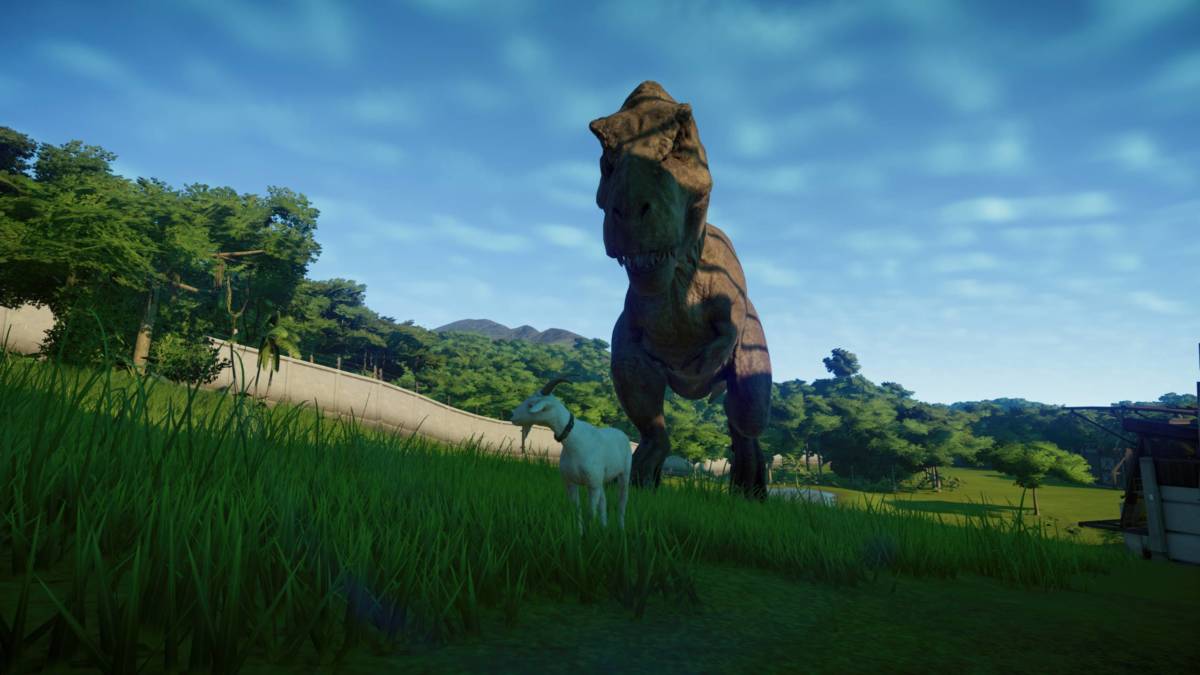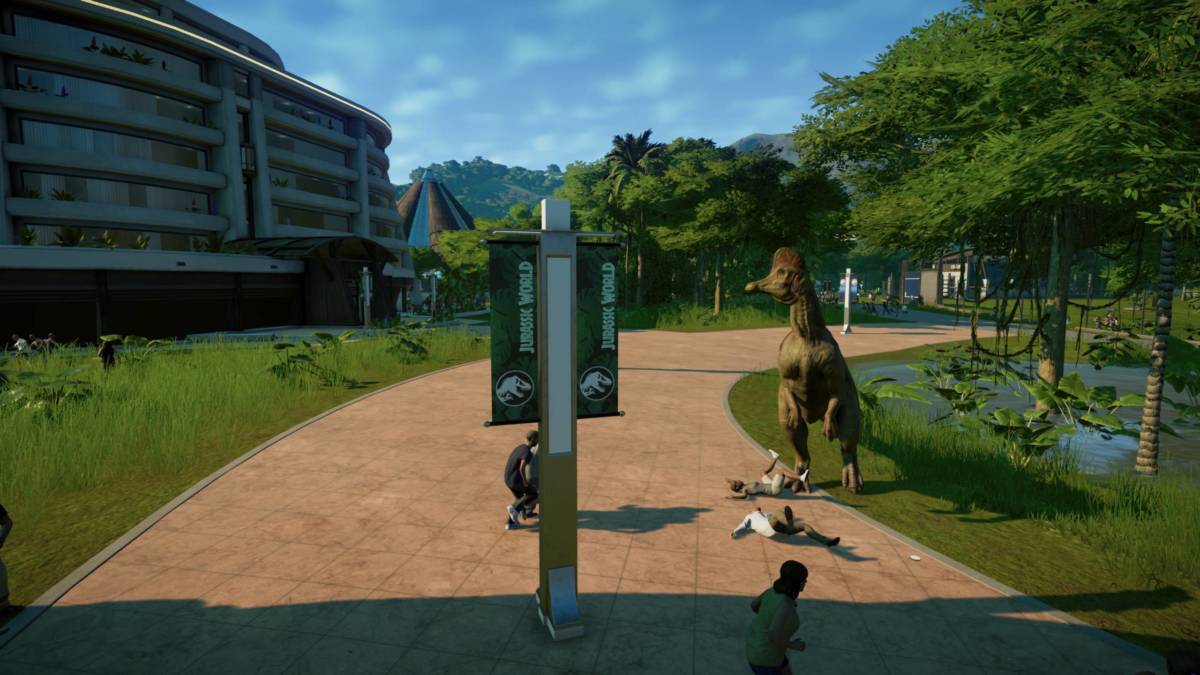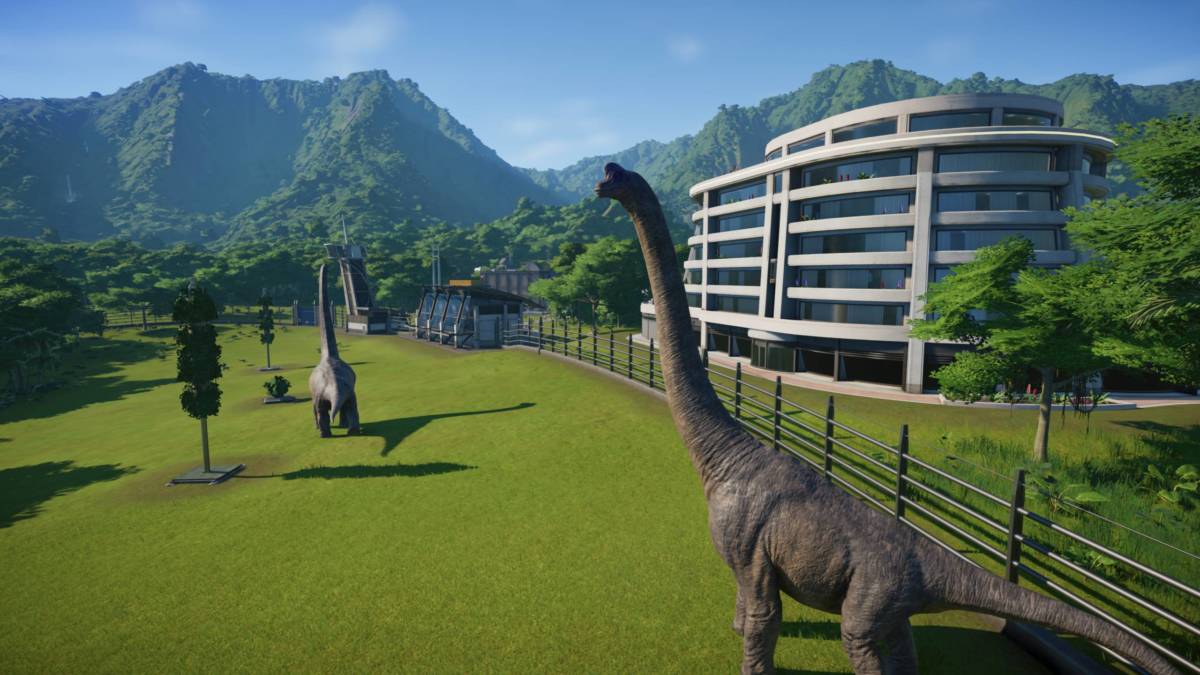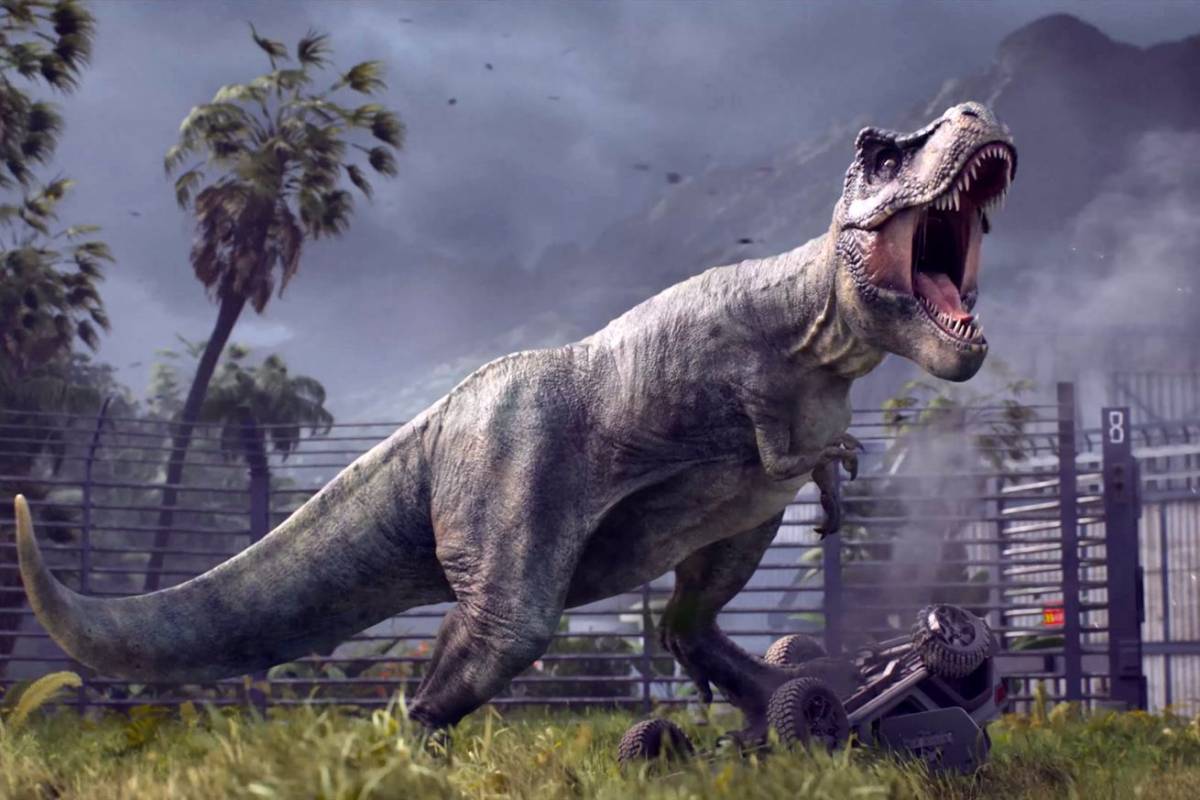Developer: Frontier Developments
Publisher: Frontier Developments
Platform(s): PC, PS4, XB1
Review copy purchased
During the beginning of my playthrough of Frontier Developments’ Jurassic World Evolution, I received a mission from head of security and, as you will learn, partial terrorist George Lambert, who tasked me to release an Edmontosaurus, a generally docile and pretty creature from the docile and pretty nation of Canada, into the park and to trample my hordes of guests. For security reasons.
Okay.
This early mission on the game’s tutorial island of Isla Matanceros sets the tone of Jurassic World Evolution real quick, establishing 1) it really wants to bring you an honest-to-God Jurassic Park experience, and 2) it’s a bit muddled. For the uninitiated, Jurassic World Evolution is a park management sim that tasks you with building and operating your very own dinosaur menagerie, with all the joy and hardship that such an endeavour brings. It mostly succeeds and it’s great fun, a must-buy for the Jurassic fan in your life. Bear that in mind when I say the game has its share of problems.
The key selling point of Evolution, as you might have guessed, is the dinosaurs. No two ways about it, they’re the most stunning things in a game already easy on the eyes. They’re the soul of Evolution and witnessing a Triceratops emerge from its creation lab for the first time struck a deep chord, watching it run and examine its surroundings, perceiving life in its eyes. Each new dinosaur release activates a skippable cutscene, giving you a first-hand look at your creature emerging into a foreign tropical paradise. Of all the game’s “holy shit look at THAT!” moments, it’s the one that resonates most. I got to a point where I restricted myself to seeing the first of a new species, since each of these cutscenes are 30 seconds of your day, but they’re fantastic all the same.

And there are many species – 37 (42 if you get the deluxe edition) to pick from. The selection has ample variety, a dinosaur for everyone. These dinosaurs are undoubtedly the game’s biggest strength and, to some degree, one of its biggest weaknesses. While each species looks unique and sounds unique, their behaviour doesn’t hold up to scrutiny, a recurring issue I found with Jurassic World Evolution – everything is dandy at first glance until you pull out the microscope. Evolution’s dinosaurs are burdened by a limited behaviour set, bringing to light some frankly strange design choices, perhaps the most conspicuous being a lack of herding patterns among herbivores and pack hunting among carnivores, in particular the Velociraptor.
This is more strange when these very behaviours were demonstrated in Evolution’s first gameplay reveal last October. Sleep only occurs when an animal is very sick, acting as an indicator of health. That’s fine, I hate moving when I have a cold too, but it’s odd to watch your dinosaurs for a prolonged period of time and have them just… exist in a perpetual state of standing. Despite there being 42 species, I felt I saw most of what these creatures had to offer by the time I acquired roughly half the roster. Make no mistake, the A.I. is generally okay, the animations that are there are beautifully choreographed, but I don’t think it’s a stretch to have expected at least the behaviours dinosaurs had in 2003’s Jurassic Park: Operation Genesis, of which Evolution is a spiritual successor to.
Of course, dinosaurs have needs that you have to attend to, such as making sure the grassland-to-forest ratio for an individual species is satisfactory and making sure they don’t starve to death, but you’re not going to get very far lest you make some moolah. And guests aren’t going to pay for a shitshow.
Or so you’d think. Dinosaur breakouts are going to be a fact of life for you and each time one happens it damages your park rating. This isn’t a lasting effect that’ll make you reconsider your park management strategy. For example, my Corythosaurus (hadrosaurs in general are a feisty bunch) decided it was lonely. Like all lonely things, she went about trampling the living hell out of everybody around her.

Wow, there’s clearly a lack of security in this park and we should be more cautious around it, rational people would think. But once Ms. Cory is tranquilized, transported, her fence repaired, yada yada, your clientele are eager to forget the semi-massacre that occurred literally a minute ago and, soon enough, you’ll be back in the 5-star graces. Evolution walks a fine line here, juggling that “true” Jurassic Park experience – wherein your dinosaurs are a persistent threat towards visitors – and a park simulation experience. And again, it mostly succeeds as a whole, but the lack of interesting repercussions aside from lawsuits (that mean nothing if you have a healthy bank account) makes this aspect of the game feel hollow. Breakouts are exhilarating the first few times, but they quickly get rote.
Guests in Jurassic World Evolution are interesting, primarily because they don’t really “exist.” Let me explain. Evolution’s financial and guest management is predicated on statistics rather than physical guest agents interacting with your park, which is to say the game’s crowds are cosmetic avatars for these numbers (e.g., the number of people you see walk into a gift shop doesn’t dictate how much that gift shop makes, or how many guests the shop’s panel says it receives).
That has some ups and downs – pro being guests probably won’t bog down your hardware and you don’t have to worry about Brenda from Maryland or whatever not finding a food shop, con being guests are a singular blob with a uniform opinion of your park, devoid of personality. It gets especially noticeable when you place down a viewing vent and dozens of people stream out, despite nobody entering your park yet. One of the most satisfying things in any tycoon/sim for me is being able to click on an individual, see what they’re thinking, what they like/dislike, and follow them about their day. It’s something that harkens back to even the first RollerCoaster Tycoon. Not being able to do this in Evolution is disappointing. Guests will react to your park, oohing and awwing at your dinosaurs, holding hands and conversing with others, but it’s scripted instead of simulated. Eventually they’ll just vanish, maybe through a store’s doors (which never open), creating a disconnect between you and the visitors you’re supposed to please and protect.

Aside from the physical guests you see in the park, Evolution’s management is pretty fine. There’s a lot of busywork to do in the day-to-day operations of your park and it never feels like a grind. Your chief goals are to collect dinosaur fossils, extract for genome, maintain steady research to keep progressing your park, and make sure visitor and beast alike are satisfied. There’s a neat feature where you can splice a dinosaur’s genetic code with a creature of choice, offering incentives like increased attack, defense, lifespan, etc. stats. It decides particular things about your dinosaurs, such as the likelihood of them winning a fight, or their resilience towards disease. It doesn’t affect their behaviour, though – e.g., increasing a dinosaur’s attack stat won’t make that dinosaur more aggressive in turn. Still, it’s one of Evolution’s niftier ideas.
Your progress is somewhat dictated by your reputation with the game’s three divisions: Science, Entertainment, and Security. Each of these divisions are headed by figures who are a little interesting and will interact with you throughout the game, throwing out some grade-A bad dialogue here and there. They’re never irritating, however, and you don’t have to take their contracts/missions if you don’t want to, at the expense of unlocks. In theory, having to please these factions adds a unique layer to your typical park management game, and their missions do work well to keep you busy and doing new things.
The issue with these departments is that there’s little attention to detail and sometimes they’re outright nonsensical. You see, preferring one division over another causes the other division to throw a fit and screw with your park in a number of ways, to something manageable like poisoning your dinosaurs – which you can easily remedy by tasking your rangers, who use a vehicle you can drive yourself (and it’s joyous) – to something more problematic like opening all your enclosure gates. Sabotage is the prominent downfall in the first Jurassic Park, yes, but am I really supposed to buy that somebody’s willing to cause millions of dollars in damages and potentially kill hordes of people because they feel kinda neglected? You’re able to take contracts from these divisions for some income, but they’re arbitrary, offering similar varieties of contract (breed this dinosaur, send an expedition for X fossil, etc.) with the caveat that the one they give will suddenly, and for no discernible reason, piss off the other departments.
Also adding commentary on your journey is Jeff Goldblum as Dr. Ian Malcolm, reprising his role with the gusto of a man seeking the easiest paycheque ever. It’s simply nice to have him around, if that helps. Film characters such as Claire Dearing and Dr. Henry Wu are voiced by their film counterparts, Bryce Dallas Howard and B.D. Wong, respectively, plus there’s a dude trying his absolute damndest to give a solid Chris Pratt impression. There isn’t a story to compliment these additions, unexpected given the game’s lead writer implied such a thing existed. Evolution hints at something of a plot here and there, mainly to do with militarized dinosaurs (my least favourite plot thread in 2015’s Jurassic World, so you can imagine how happy I was to see that nearly doubled down), but it never, like, goes anywhere. It’s not something I mind much at all, but it would’ve been interesting to see a new Jurassic story told in this format.
Aside from managing, you’re going to spend a lot of time building your Jurassic World and it’s one of the most enjoyable things about the game. Just by principle alone – you’re building a dinosaur park for fuck’s sake. Evolution’s park building tools are decently intuitive, though occasionally frustrating, with some buildings refusing to place here and there if there’s even a semblance of hilly terrain, but it’s easy enough to build something functional.
Evolution’s aesthetic draws from the sleek corporate vibe of Jurassic World rather than the warm safari palette of Jurassic Park, but if you take your time you can build a pretty nice-looking place, and there’s no greater satisfaction than zooming out and seeing your work in action (did I mention the game is gorgeous?). I do wish there were just a few more building options, or even varieties of the ones the game already has. Since there’s a glaring lack of decorations, one of the more eyebrow-raising omissions, you’ll reach a point where your park’s personal touch will be exclusive to layout and dinosaur selection. That in itself isn’t necessarily terrible, but it hampers replayability.

I make it seem like I dislike the game, but make no mistake, I played it for 16 straight hours the moment it came out. What Evolution nails is the feeling of accomplishment, of you knowing that this place with incredibly unique animals is your doing. It’s a childhood dream come to life, various flaws notwithstanding. The game was quite obviously rushed to tie-in with the new movie Jurassic World: Fallen Kingdom, but Frontier have demonstrated a history of taking in player feedback and supporting their games for a long while. It brings to mind their last outing, 2016’s Planet Coaster. That felt a bit barebones upon release, but the Planet Coaster we have now is a swell upgrade over the one we initially received.
When it comes to bang for your buck, it truly depends. If you love this universe, go for it. There’s much to enjoy. As a tycoon it offers plenty of stuff to do, with the campaign taking 25-30 hours, give or take a few hours when accounting for playstyle. There’s a sandbox mode as well, letting you have a little dinosaur side garden with the things you’ve unlocked during the campaign. A challenge mode would extend the game’s longevity greatly, so here’s hoping that sees the light of day. I didn’t happen upon even a slightly game-breaking bug and aside from some clipping/animation issues and a kind of hilarious glitch that places guests in dinosaur enclosures (three guesses how that ends), the game is polished.
That said, I can’t recommend it just yet to anybody who’s anticipating a deep management experience, or a game that lets you get wildly creative with park design. You’ll walk away disappointed if you expect either.
Jurassic World Evolution is far from a perfect game and sometimes it’s a questionable one, but occasionally something will grab you – whether it’s the call of a Brachiosaurus in the horizon, seeing a Tyrannosaurus stare down a guest on the other side of the fence, or getting a grand view of your park itself – and it feels like magic. The game’s lovingly crafted by people who are fond of the Jurassic franchise and you can sense it everywhere. That fondness speaks to the incredible potential Evolution has. There’s a bright future ahead for this.
Some of the coverage you find on Cultured Vultures contains affiliate links, which provide us with small commissions based on purchases made from visiting our site. We cover gaming news, movie reviews, wrestling and much more.



